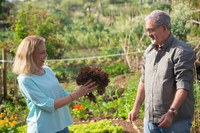Dakota Gardener: Conversations with a gardener
(Click an image below to view a high-resolution image that can be downloaded)
By Emily How, Horticulture agent
NDSU Extension – Ward County
Working with gardeners, I get to have a lot of different conversations about gardening trends. Some of my favorites are with people about the obscure and strange trends that float around social media or topics from old wives' tales. So, I asked a fellow gardener what their thoughts were on some of these topics.
I asked, “What do you think about dandelions in your garden?”
Their response was, “Keep them out, but I do hear that they are good for aeration.”
This is true. A dandelion’s taproot system penetrates deep into the soil and breaks up compacted areas. This allows for more water and air to move through the soil and benefits soil health.
I asked, “How do you feel about some of the new garden technology?”
“I like my garden tech-free,” was the reply.
Technology has started to grow in the gardening world. Some people find it useful to have additional technology in their garden; some do not. Technology can come in different shapes and forms. Evolving technology advancements make gardening more accessible to different individuals.
When asked, “What do you think about some of the new techniques, like straw bale gardening?”
Their response was, “Interesting, but weird. Also, loose straw would be everywhere.”
Straw bale gardening allows for planting without soil. There are several types of plants that grow well in a straw bale, including tomatoes, peppers and squash. A successful straw bale garden needs to receive plenty of light and consistent moisture.
“What do you think about some of the fertilizing techniques, such as buried fish heads or diluted urine as a fertilizer?” I asked.
“Gross and no,” came the reply.
Instead of fertilizing with fish heads, try using fish meal. The nutrients are comparable, and you will have fewer critters trying to dig out a fish head from the garden. Even though it’s already being used around the world as a fertilizer, diluted urine is still being researched. The big questions regarding this topic are how to do this on a large scale and how to make sure that the produce is safe for consumption.
“How do you feel about chaos gardening, when people just throw seeds on bare soil and walk over it?” I asked.
“What? No! There’s no rhyme or reason, or plant labels,” my gardening friend replied.
This can be a fun, carefree way to plant a garden, but if you prefer a nicely manicured garden and, at least, a semi-organized garden where you know where things are growing, this method is not for you. Also, I would not recommend chaos gardening for the novice gardener who may still be learning to identify what certain crops look like.
I asked my fellow gardener, “What are some of your favorite garden tips?” Here’s what they recommended:
- Take time to enjoy your garden.
- Never give up on a plant as it may just surprise you.
- Nature happens. Brace yourself for deer, birds, bugs, bunnies, rodents and weather to derail your plans and hard work.
- Sharing is caring. Share your produce, your seeds, your knowledge and passion with others.
- Try new things; you might stumble upon something good.
I recommend chatting with your fellow gardeners to find out what is working for them. The opportunity to learn and laugh is priceless. How do your conversations with other gardeners sound?
NDSU Agriculture Communication – Sept. 17, 2025
Source: Emily How, 701-857-6444, emily.how@ndsu.edu
Editor: Kelli Anderson, 701-231-6136, kelli.c.anderson@ndsu.edu




